(word完整版)高考英语省略句考点全归纳,推荐文档
高考英语省略句精编WORD版

高考英语省略句精编W O R D版IBM system office room 【A0816H-A0912AAAHH-GX8Q8-GNTHHJ8】省略句为了使讲话和行文简洁,句中某些成分有时可省略。
省略可分以下几种情况:(一)简单句中的省略1、省略主语:祈使句中主语通常省略。
其它省略主语多限于少数现成的说法。
e.g. (I) Thank you for your help.(括号内为省略的词语,下同) (I) See you tomorrow.(It) Doesn’t matter.2、省略主谓语或主谓语的一部分。
e.g. (There is) No smoking.(Is there) Anything wrong?Why (do you) not say hello to him?3、省略作宾语的不定式短语,只保留to。
e.g. ---- Are you going there?---- I’d like to (go there).He did not give me the chance, though he had promised to (give me the chance).(动词:want, wish, expect, hope, like, love, try, forget, decide,prefer, mean, intend, plan, refuse…等动词宾语。
tell, ask, want, expect, warn…等动词的宾补。
形容词:glad, happy, pleased, delighted, …短语:be going to, be about to, be able to, have to, used to, ought to, …)注意:如果该宾语是be动词或完成时态,则须在to之后加上be或have。
e.g. ---- Are you an engineer?---- No, but I want to be.---- He hasn’t finished the task yet.---- Well, he ought to have.4、省略表语。
高考英语专题省略句知识点分类汇编及解析
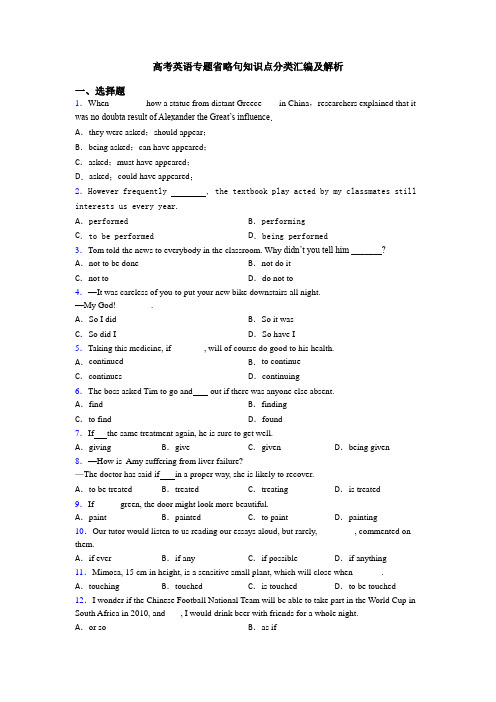
高考英语专题省略句知识点分类汇编及解析一、选择题1.When ________how a statue from distant Greece____in China,researchers explained that it was no doubta result of Alexander the Great’s influence.A.they were asked;should appear;B.being asked;can have appeared;C.asked;must have appeared;D.asked;could have appeared;2.However frequently , the textbook play acted by my classmates still interests us every year.A.performed B.performingC.to be performed D.being performed3.Tom told the news to everybody in the classroom. Why didn’t you tell him _______?A.not to be done B.not do itC.not to D.do not to4.—It was careless of you to put your new bike downstairs all night.—My God!________.A.So I did B.So it wasC.So did I D.So have I5.Taking this medicine, if _______, will of course do good to his health.A.continued B.to continueC.continues D.continuing6.The boss asked Tim to go and out if there was anyone else absent.A.find B.findingC.to find D.found7.If the same treatment again, he is sure to get well.A.giving B.give C.given D.being given 8.—How is Amy suffering from liver failure?—The doctor has said if in a proper way, she is likely to recover.A.to be treated B.treated C.treating D.is treated9.If _____ green, the door might look more beautiful.A.paint B.painted C.to paint D.painting10.Our tutor would listen to us reading our essays aloud, but rarely, ________, commented on them.A.if ever B.if any C.if possible D.if anything 11.Mimosa, 15 cm in height, is a sensitive small plant, which will close when ______. A.touching B.touched C.is touched D.to be touched 12.I wonder if the Chinese Football National Team will be able to take part in the World Cup in South Africa in 2010, and ___, I would drink beer with friends for a whole night.A.or so B.as ifC.even so D.if so13.A good interviewer is able to tell very quickly if you’ve done your homework about the company, so make sure you ________!A.do B.have C.will do D.did14.—Have you got any particular plans for the coming holiday?—Yes. ______, I'm going to visit some homes for the old in the city.A.If ever B.If busy C.If anything.D.If possible 15.Present at the funeral were about 1000 people, many more than__________.A.is expected B.expectedC.having expected D.having been expected16.—Mr. Scott has received the invitation to his ex-girlfriend’s wedding ceremony this weekend. Will he attend it?—No, he has finally decided _____.A.not B.not toC.not to go D.not to go to17.Money is a needful and precious thing, and when ______, a noble thing, but I never want you to think it is the first or only prize to strive for.A.well used B.well usingC.to well use D.being well used18.Although _____ by the opposite team, the players were not discouraged but practiced harder.A.beating B.beatenC.having beaten D.being beaten19.Unless _______ , he kept silent all the time.A.spoken B.being spoken to C.spoken to D.speaking to20.---How is the man injured in the earthquake?---The doctor said if _________ in a proper way, he was likely to be saved.A.treated B.treatingC.is treated D.to be treated21.Some of you may have finished unit one. _____ , you can go on to unit two.A.If you may B.If you do C.If not D.If so22.When ________ for his views about his teaching job, Philip said he found it very interesting and rewarding.A.asking B.asked C.to ask D.having asked 23.Although ________ to stop, he kept on workingA.tell B.telling C.having told D.told24.When _______the two countries, we’ve found they have much in common. A.compared B.compare C.being compared D.comparing 25.Unless ________ to speak, most high school students here prefer remaining silent in class. A.invited B.inviting C.being invited D.having invited【参考答案】***试卷处理标记,请不要删除一、选择题1.D解析:D【解析】【分析】【详解】考查状语从句的省略和情态动词。
高考英语省略句知识点分类汇编附解析
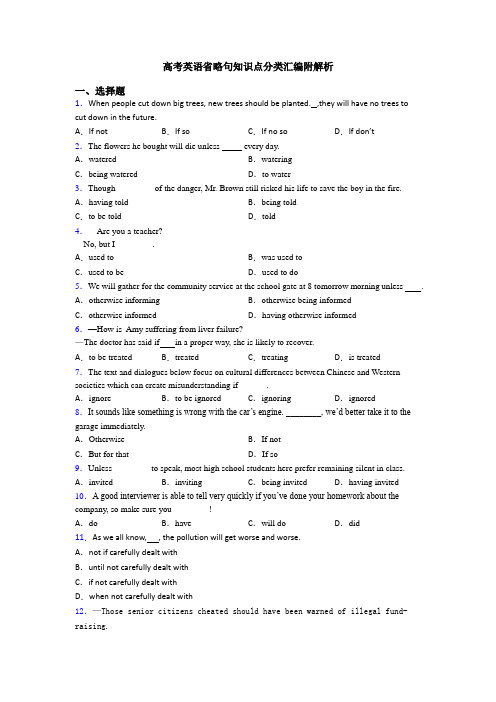
高考英语省略句知识点分类汇编附解析一、选择题1.When people cut down big trees, new trees should be planted. ,they will have no trees to cut down in the future.A.If not B.If so C.If no so D.If don’t2.The flowers he bought will die unless every day.A.watered B.wateringC.being watered D.to water3.Though ________ of the danger, Mr. Brown still risked his life to save the boy in the fire. A.having told B.being toldC.to be told D.told4.---Are you a teacher?---No, but I ________.A.used to B.was used toC.used to be D.used to do5.We will gather for the community service at the school gate at 8 tomorrow morning unless . A.otherwise informing B.otherwise being informedC.otherwise informed D.having otherwise informed6.—How is Amy suffering from liver failure?—The doctor has said if in a proper way, she is likely to recover.A.to be treated B.treated C.treating D.is treated7.The text and dialogues below focus on cultural differences between Chinese and Western societies which can create misunderstanding if ______.A.ignore B.to be ignored C.ignoring D.ignored8.It sounds like something is wrong with the car’s engine. ________, we’d better take it to the garage immediately.A.Otherwise B.If notC.But for that D.If so9.Unless ________ to speak, most high school students here prefer remaining silent in class. A.invited B.inviting C.being invited D.having invited 10.A good interviewer is able to tell very quickly if you’ve done your homework about the company, so make sure you ________!A.do B.have C.will do D.did11.As we all know, , the pollution will get worse and worse.A.not if carefully dealt withB.until not carefully dealt withC.if not carefully dealt withD.when not carefully dealt with12.—Those senior citizens cheated should have been warned of illegal fund-raising.—________. But few could resist the temptation.A.They were B.They shouldC.They must D.They did13.Although not as such, those large-scale military exercises with America were partly aimed at scaring the North Korea.A.being advertised B.advertisingC.having advertised D.advertised14.He is only too ready to help others, seldom, ____, refusing them when they turn to him. A.if never B.if ever C.if not D.if any 15.Unless______, this law will make life difficult for farmers.A.changed B.changingC.being changed D.is changing16.Experts have found that the disease will lead to a greater increase in the number of sufferers unless________seriously when the symptom first appears.A.treated B.to be treatedC.being treated D.be treated17."Talking with others in the real world always me embarrassed and my heart beats quickly. I never dare to look in anyone’s eyes when ," the 22-year-old said, describing her anxiety. A.make; speaking B.makes; speakingC.makes; speak D.make; speak18.—What’s your dream?—Well, my parents wouldn’t expect me to be a banker, but I still .A.hope to B.hope so C.hope not D.hope for 19.This golden opportunity _____ your full attention although ________ to seize.A.worthy of; is hard B.worth; being hardC.is worthy; it hard D.is worth; hard20.---How is the man injured in the earthquake?---The doctor said if _________ in a proper way, he was likely to be saved.A.treated B.treatingC.is treated D.to be treated21.There are some health problems that, when ____in time, can become bigger ones later on. A.not treated B.not being treatedC.not to be treated D.not having been treated22.The cloth ______easily if _______on a table.A.measures, spreading B.will be measured, spread C.measures, spread D.is measured, spread23.Once _______ in the forest, we should remain ________ we are and wait for help. A.losing; there B.losing; where C.lost; there D.lost; where 24.Though _______ by her classmates, the little girl didn’t burst into tears or be in despair. A.leaving out B.left outC.being left out D.leave out25.—Should I look up the new words each time I come across some?—No, refer to your dictionary only ______.A.where possible B.when necessary C.if ever D.if so【参考答案】***试卷处理标记,请不要删除一、选择题1.A解析:A【解析】试题分析:A;考查省略句。
高考英语省略知识点总结
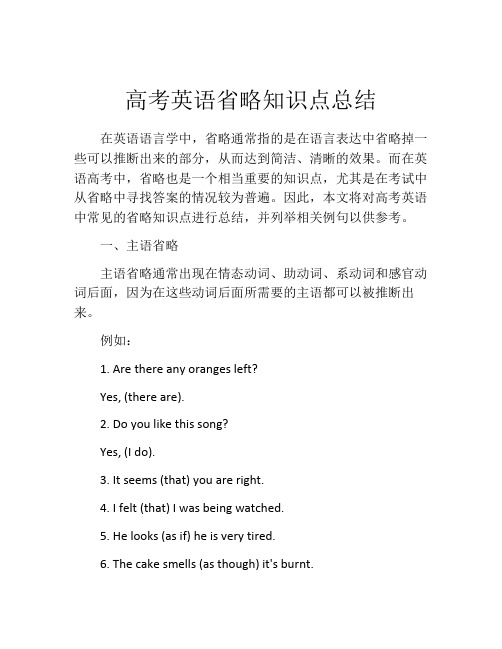
高考英语省略知识点总结在英语语言学中,省略通常指的是在语言表达中省略掉一些可以推断出来的部分,从而达到简洁、清晰的效果。
而在英语高考中,省略也是一个相当重要的知识点,尤其是在考试中从省略中寻找答案的情况较为普遍。
因此,本文将对高考英语中常见的省略知识点进行总结,并列举相关例句以供参考。
一、主语省略主语省略通常出现在情态动词、助动词、系动词和感官动词后面,因为在这些动词后面所需要的主语都可以被推断出来。
例如:1. Are there any oranges left?Yes, (there are).2. Do you like this song?Yes, (I do).3. It seems (that) you are right.4. I felt (that) I was being watched.5. He looks (as if) he is very tired.6. The cake smells (as though) it's burnt.二、宾语省略宾语省略通常出现在动宾结构中,即有一个及物动词和需要一个宾语的情况下,这个宾语可以被省略掉。
例如:1. He enjoys (playing) basketball.2. Would you like (some) tea?3. They considered (him) to be the best candidate.4. I saw (a man) run across the road.三、介词省略介词省略通常指省略掉可以在上下文中推断出来的介词。
此外,在固定短语中,常用的介词也可以被省略掉。
例如:1. I am (going) to the supermarket.2. She arrived (at) the airport at 2 p.m.3. He excels (in) mathematics.4. I'm interested (in) Chinese culture.四、代词省略代词省略通常出现在上下文中出现了相应的代词的情况下,可以省略掉相应的代词。
省略句考点全归纳(附专题练习),英语提分超有用!

省略句考点全归纳(附专题练习),英语提分超有用!
英语中有时为了避免重复,使语言简练紧凑,在不损害句子结构的前提下,往往省去一个或多个句子成分,这种语法现象被称为省略。
一、简单句中的省略
简单句中可以省略主语、谓语、主语和谓语的一部分、宾语等。
例如:
(I) Beg your pardon.
(Do you) Have a good time in Beijing?
二、不定式to后省略动词
省略不定式后的动词,保留不定式符号to。
注意:若承前省略的不定式内容是be或作助动词的have时,保留be或have。
例如:
He didn’t come, though we had invited him to.
— Are you a teacher?
— No, but I used to be.
三、定语从句中的省略
当关系代词that, which等在限制性定语从句中充当宾语且不位于介词之后时,关系代词可以省略;in which或that在先行词way后时可以省略。
例如:
This is the present (that / which) my mother gave me for my birthday.
I don’t like the way (in which / that) you stare at me when I am eating.。
(完整word版)高考英语省略句常见的陷阱题型(一).docx
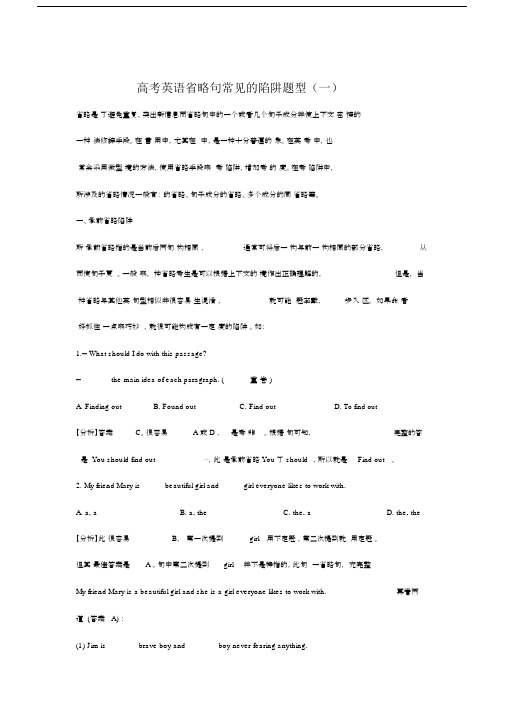
高考英语省略句常见的陷阱题型(一)省略是了避免重复、突出新信息而省略句中的一个或者几个句子成分并使上下文密接的一种法修辞手段。
在言用中,尤其在中,是一种十分普遍的象。
在英考中,也常会采用微型境的方法,使用省略手段来考陷阱,增加考的度。
在考陷阱中,所涉及的省略情况一般有:的省略、句子成分的省略、多个成分的同省略等。
一、承前省略陷阱所承前省略指的是当前后两句构相同,通常可将后一构与前一构相同的部分省略,从而使句子更。
一般来,种省略考生是可以根据上下文的境作出正确理解的,但是,当种省略与其他英句型相似并很容易生混淆,就可能冠李戴,步入区。
如果命者好抓住一点来巧妙,就很可能构成有一定度的陷阱。
如:1.— What should I do with this passage?—_____ the main idea of each paragraph. (重卷)A. Finding outB. Found outC. Find outD. To find out【分析】答案C。
很容易 A 或 D ,是考非。
根据句可知,完整的答是 You should find out⋯,此是承前省略You了should,所以就是Find out。
2. My friend Mary is _____ beautiful girl and _____ girl everyone likes to work with.A. a, aB. a, theC. the, aD. the, the 【分析】此很容易B,第一次提到girl用不定冠,第二次提到就用定冠。
但其最佳答案是 A 。
句中第二次提到girl并不是特指的,此句一省略句,充完整My friend Mary is a beautiful girl and she is a girl everyone likes to work with.再看两道 (答案 A) :(1) Jim is _______ brave boy and _______ boy never fearing anything.A. a, aB. a, theC. the, aD. the, the(2) It is really _______ useful dictionary and _______ dictionary every one of us needs.A. a, aB. a, theC. the, aD. the, the3. “ What made her struggle to become an artist so hard?”“ ______ she was a woman.A. /B. WhenC. ThatD.What【分析】此题最佳答案选C。
高考英语省略句知识点全集汇编及解析

高考英语省略句知识点全集汇编及解析一、选择题1.When people cut down big trees, new trees should be planted. ,they will have no trees to cut down in the future.A.If not B.If so C.If no so D.If don’t 2.Alcohol can damage the liver and do great harm if in large quantities.A.to be consumed B.to consumeC.consuming D.consumed3.—Those senior citizens cheated should have been warned of illegal fund-raising.—________. But few could resist the temptation.A.They were B.They shouldC.They must D.They did4.I decide I will not attend her birthday party ________.A.if inviting B.when invitingC.unless invited D.while invited5.We will gather for the community service at the school gate at 8 tomorrow morning unless . A.otherwise informing B.otherwise being informedC.otherwise informed D.having otherwise informed6.If ________ to very loud music every day, young people may risk going deaf.A.expose B.exposingC.exposed D.to expose7.If _____ green, the door might look more beautiful.A.paint B.painted C.to paint D.painting8.Nu r series are the areas where plants are grown to be sold or ______ in other places. A.being planted B.to plant C.plant D.planted9.It sounds like something is wrong with the car’s engine. ________, we’d better take it to the garage immediately.A.Otherwise B.If notC.But for that D.If so10._____, a man who expresses himself effectively is sure to succeed more rapidly than a man whose command of language is poor.A.Other things were equalB.Other things being equalC.To be equal to other thingsD.Other things to be equal11.When ________how a statue from distant Greece____in China,researchers explained that it was no doubta result of Alexander the Great’s influence.A.they were asked;should appear;B.being asked;can have appeared;C.asked;must have appeared;D.asked;could have appeared;12.Jerry has promised to keep the secret, so he won't tell anyone eventhough .A.asking to B.to be askedC.to ask D.asked to13.I can’t imagine what air we would be breathing in if we __________ anything to stop air pollution.A.hadn’t done B.didn’t doC.haven’t done D.don’t do14.Some experts believe that the students, once ______ to computer games, will probably lose opportunities of progressing.A.addicting B.addicted C.having addicted D.being addicted 15.Unless______, this law will make life difficult for farmers.A.changed B.changingC.being changed D.is changing16.We all know that, __________, the situation will get worse.A.not if dealt carefully with B.if not carefully dealt withC.if dealt not carefully with D.not if carefully dealt with17.When________, the museum will be open to the pulic next year.A.to be completed. B.completingC.being completed D.completed18."Talking with others in the real world always me embarrassed and my heart beats quickly. I never dare to look in anyone’s eyes when ," the 22-year-old said, describing her anxiety. A.make; speaking B.makes; speakingC.makes; speak D.make; speak19.This golden opportunity _____ your full attention although ________ to seize.A.worthy of; is hard B.worth; being hardC.is worthy; it hard D.is worth; hard20.The driver stopped the car a cat across the street.A.to let; to walk B.letting; walkC.letting; walking D.to let; walk21.There are some health problems that, when ____in time, can become bigger ones later on. A.not treated B.not being treatedC.not to be treated D.not having been treated22.The new treatment means, if _______ to the NCR will make all the difference for the general public.A.applying B.to apply C.applied D.having applied 23.Although ________ to stop, he kept on workingA.tell B.telling C.having told D.told24.When _______the two countries, we’ve found they have much in common. A.compared B.compare C.being compared D.comparing 25.As we all know, , the pollution will get worse and worse.A.not if carefully dealt withB.until not carefully dealt withC.if not carefully dealt withD.when not carefully dealt with【参考答案】***试卷处理标记,请不要删除一、选择题1.A解析:A【解析】试题分析:A;考查省略句。
高考英语省略知识点
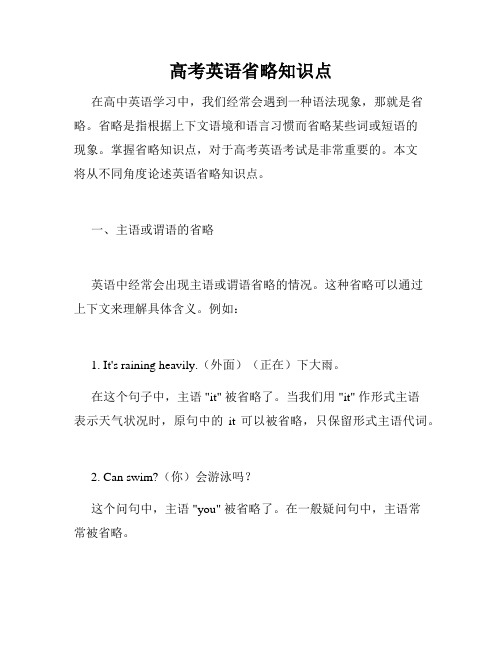
高考英语省略知识点在高中英语学习中,我们经常会遇到一种语法现象,那就是省略。
省略是指根据上下文语境和语言习惯而省略某些词或短语的现象。
掌握省略知识点,对于高考英语考试是非常重要的。
本文将从不同角度论述英语省略知识点。
一、主语或谓语的省略英语中经常会出现主语或谓语省略的情况。
这种省略可以通过上下文来理解具体含义。
例如:1. It's raining heavily.(外面)(正在)下大雨。
在这个句子中,主语 "it" 被省略了。
当我们用 "it" 作形式主语表示天气状况时,原句中的it 可以被省略,只保留形式主语代词。
2. Can swim?(你)会游泳吗?这个问句中,主语 "you" 被省略了。
在一般疑问句中,主语常常被省略。
3. Coming!(我正在)来了!这个句子中,谓语 "am" 被省略了。
在表示将来的动作时,主语 "I" 的 "am" 可以省略。
二、宾语的省略在某些情况下,宾语可以被省略掉。
这种省略通常出现在某些固定句型中,常要根据上下文来理解。
例如:1. Can you pass (me) the salt?这个句子中,宾语 "me" 被省略了。
在交际用语中,表示请求或指示对方给予自己某物时,宾语往往被省略。
2. Let's go (to) the park.这个句子中,宾语 "to" 被省略了。
在 go, come, return, fly, drive 等表示“去”或“来”的动词后,表示地点的宾语常被省略。
三、连词的省略有时候,连词也可以被省略。
这种省略常见于并列连词和条件连词。
例如:1. You can have either apples (or) oranges.这个句子中,连词 "or" 被省略了。
省略句(完整归纳)

多变的省略句高考常考内容:1.省略主语,主谓语或主谓的一部分 2.不定式符号to的省略 3.不定式结构中动词的省略4.状语从句中的省略5.定语从句中关系词的省略6.虚拟语气中if和should的省略7.考查not, so, neither, nor的“替代性”省略掌握好省略句,应注意以下几条:1.感官动词或使役动词(如:notice, hear, let, make)等后接不定式作宾补时省略to,被动时to不能省略。
2.在pre fer to do rather than…, cannot help but…do, nothing …but等句型中常省略to。
3.为避免重复,作某些动词(hope, want)等宾语或(tell, order, ask)的宾补时,省略不定式短语,只保留to.4.应注意状语从句、定语从句中的省略。
5.注意not ,so ,neither, nor的“替代性”省略。
6.状语从句中,如果谓语含动词be,主语又与主句主语一致或主语是it,从句中主语和be一齐省略。
7.常见的省略形式:(1)If (it is)possible[如果可能的话];(2)If (it is) necessary[如果必要的话];(3)If any: 例: Correct the mistakes in the passage if (there is) any (mistakes)比较:Do you have anything to say? (不知道对方是否有话要说,) Do you have something to say?(认为对方有话要说.)一、替代省略1. 用it, one, that,ones, those替代句子中重复出现的名词、代词或句子。
one是指代同名称的另一样东西(同类异物),代替前面句子中重复出现的可数名词;that替代特指可数或不可数名词,后面常跟有in或of短语作后置定语;it指代同名称的同样事物(同类同物)。
高考英语最新省略句知识点全集汇编及答案解析(1)

高考英语最新省略句知识点全集汇编及答案解析(1)一、选择题1.Present at the funeral were about 1000 people, many more than__________.A.is expected B.expectedC.having expected D.having been expected2.Alcohol can damage the liver and do great harm if in large quantities.A.to be consumed B.to consumeC.consuming D.consumed3.Unless to speak, you should remain silent at the conference.A.invited B.invitingC.being invited D.having invited4.Some of you may have finished the text. _______, you can go on to the next.A.If ever B.If soC.If possible D.If not5.If the same treatment again, he is sure to get well.A.giving B.give C.given D.being given6.I decide I will not attend her birthday party ________.A.if inviting B.when invitingC.unless invited D.while invited7.—Frequent lack of breakfast does harm to health.— , why do you always do that?A.So what B.If so C.If any D.Even so8.If ______ in class, you will have to clean the classroom for a week as a punishment.A.to catch to sleep B.caught to sleepC.catching sleeping D.caught sleeping9.If _____ green, the door might look more beautiful.A.paint B.painted C.to paint D.painting10.It sounds like something is wrong with the car’s engine. ________, we’d better take it to the garage immediately.A.Otherwise B.If notC.But for that D.If so11.Video games can be a poor influence if ________ in the wrong hands.A.to leave B.leaving C.leave D.left12.I wonder if the Chinese Football National Team will be able to take part in the World Cup in South Africa in 2010, and ___, I would drink beer with friends for a whole night.A.or so B.as ifC.even so D.if so13.When ________how a statue from distant Greece____in China,researchers explained that it was no doubta result of Alexander the Great’s influence.A.they were asked;should appear;B.being asked;can have appeared;C.asked;must have appeared;D.asked;could have appeared;14.Some experts believe that the students, once ______ to computer games, will probably lose opportunities of progressing.A.addicting B.addicted C.having addicted D.being addicted 15.—Mr. Scott has received the invitation to his ex-girlfriend’s wedding ceremony this weekend. Will he attend it?—No, he has finally decided _____.A.not B.not toC.not to go D.not to go to16.—Should I look up the new words each time I come across some?—No, refer to your dictionary only ______.A.where possible B.when necessary C.if ever D.if so 17.Although not as such, those large-scale military exercises with America were partly aimed at scaring the North Korea.A.being advertised B.advertisingC.having advertised D.advertised18._____ told that the concert was cancelled, many fans still gathered outside the stadium , waiting for the pop singer.A.Unless B.Though C.When D.Whether 19.—What’s your dream?—Wel l, my parents wouldn’t expect me to be a banker, but I still .A.hope to B.hope so C.hope not D.hope for 20.This golden opportunity _____ your full attention although ________ to seize.A.worthy of; is hard B.worth; being hardC.is worthy; it hard D.is worth; hard21.They finished their work earlier than ______.A.expected B.expectingC.to be expected D.being expected22.This problem may lead to more serious ones if _______ unsolved.A.making B.remained C.keeping D.left23.When ________ to someone,I usually say,“Pleased to meet you.”A.introduce B.introduced C.introducing D.am introduced 24.Though _______ by her classmates, the little girl didn’t burst into tears or be in despair. A.leaving out B.left outC.being left out D.leave out25.Unless ________ to speak, most high school students here prefer remaining silent in class. A.invited B.inviting C.being invited D.having invited【参考答案】***试卷处理标记,请不要删除一、选择题1.B解析:B【解析】【分析】【详解】考查状语从句的省略。
(完整word版)高考英语省略句考点全归纳(2),推荐文档
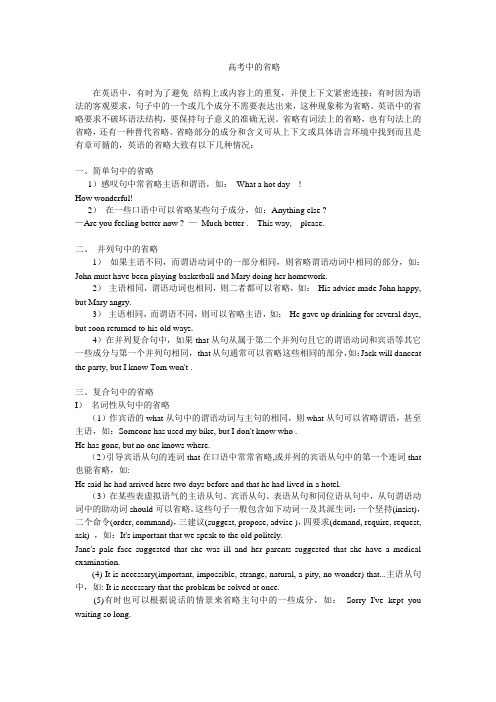
高考中的省略在英语中,有时为了避免结构上或内容上的重复,并使上下文紧密连接;有时因为语法的客观要求,句子中的一个或几个成分不需要表达出来,这种现象称为省略。
英语中的省略要求不破坏语法结构,要保持句子意义的准确无误。
省略有词法上的省略,也有句法上的省略,还有一种替代省略。
省略部分的成分和含义可从上下文或具体语言环境中找到而且是有章可循的,英语的省略大致有以下几种情况:一、简单句中的省略1)感叹句中常省略主语和谓语,如:What a hot day !How wonderful!2)在一些口语中可以省略某些句子成分,如:Anything else ?—Are you feeling better now ? —Much better . This way, please.二、并列句中的省略1)如果主语不同,而谓语动词中的一部分相同,则省略谓语动词中相同的部分,如:John must have been playing basketball and Mary doing her homework.2)主语相同,谓语动词也相同,则二者都可以省略,如:His advice made John happy, but Mary angry.3)主语相同,而谓语不同,则可以省略主语,如:He gave up drinking for several days, but soon returned to his old ways.4)在并列复合句中,如果that从句从属于第二个并列句且它的谓语动词和宾语等其它一些成分与第一个并列句相同,that从句通常可以省略这些相同的部分,如:Jack will danceat the party, but I know Tom won't .三、复合句中的省略I)名词性从句中的省略(1)作宾语的what从句中的谓语动词与主句的相同,则what从句可以省略谓语,甚至主语,如:Someone has used my bike, but I don't know who .He has gone, but no one knows where.(2)引导宾语从句的连词that在口语中常常省略,或并列的宾语从句中的第一个连词that 也能省略,如:He said he had arrived here two days before and that he had lived in a hotel.(3)在某些表虚拟语气的主语从句、宾语从句、表语从句和同位语从句中,从句谓语动词中的助动词should可以省略。
高考英语中省略常见考点讲解
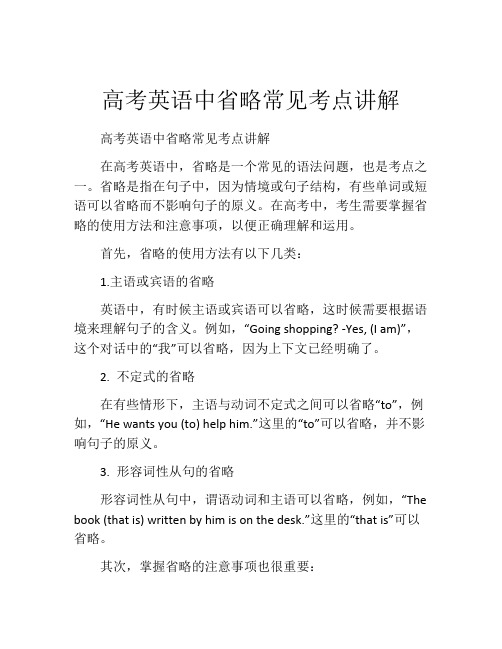
高考英语中省略常见考点讲解高考英语中省略常见考点讲解在高考英语中,省略是一个常见的语法问题,也是考点之一。
省略是指在句子中,因为情境或句子结构,有些单词或短语可以省略而不影响句子的原义。
在高考中,考生需要掌握省略的使用方法和注意事项,以便正确理解和运用。
首先,省略的使用方法有以下几类:1.主语或宾语的省略英语中,有时候主语或宾语可以省略,这时候需要根据语境来理解句子的含义。
例如,“Going shopping? -Yes, (I am)”,这个对话中的“我”可以省略,因为上下文已经明确了。
2. 不定式的省略在有些情形下,主语与动词不定式之间可以省略“to”,例如,“He wants you (to) help him.”这里的“to”可以省略,并不影响句子的原义。
3. 形容词性从句的省略形容词性从句中,谓语动词和主语可以省略,例如,“The book (that is) written by him is on the desk.”这里的“that is”可以省略。
其次,掌握省略的注意事项也很重要:1.根据上下文理解在高考英语中,出现省略的句子往往需要依靠上下文来理解,考生需要仔细阅读上下文,避免对省略造成误解。
2. 不定式的省略最常用在省略中,不定式的省略是最常见的,考生需要掌握不定式的使用方法,才能正确理解和运用省略。
3. 注意省略对句子成分的影响在句子中出现的省略,会影响到句子的成分和语法结构,考生需要仔细分析和理解涉及到的语法问题。
综上所述,省略是高考英语中的一个常见考点,考生需要掌握省略的使用方法和注意事项,以便正确理解和运用。
在备考中,可以通过大量练习和查阅相关资料来提高自己的掌握程度,避免省略造成的误解和错误。
高考英语省略句知识点全集汇编及答案解析
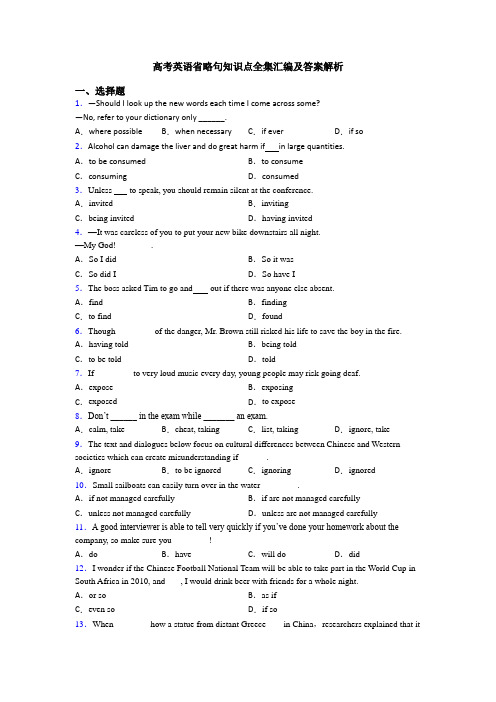
高考英语省略句知识点全集汇编及答案解析一、选择题1.—Should I look up the new words each time I come across some?—No, refer to your dictionary only ______.A.where possible B.when necessary C.if ever D.if so2.Alcohol can damage the liver and do great harm if in large quantities.A.to be consumed B.to consumeC.consuming D.consumed3.Unless to speak, you should remain silent at the conference.A.invited B.invitingC.being invited D.having invited4.—It was careless of you to put your new bike downstairs all night.—My God!________.A.So I did B.So it wasC.So did I D.So have I5.The boss asked Tim to go and out if there was anyone else absent.A.find B.findingC.to find D.found6.Though ________ of the danger, Mr. Brown still risked his life to save the boy in the fire. A.having told B.being toldC.to be told D.told7.If ________ to very loud music every day, young people may risk going deaf.A.expose B.exposingC.exposed D.to expose8.Don’t ______ in the exam while _______ an exam.A.calm, take B.cheat, taking C.list, taking D.ignore, take 9.The text and dialogues below focus on cultural differences between Chinese and Western societies which can create misunderstanding if ______.A.ignore B.to be ignored C.ignoring D.ignored 10.Small sailboats can easily turn over in the water ________.A.if not managed carefully B.if are not managed carefullyC.unless not managed carefully D.unless are not managed carefully11.A good interviewer is able to tell very quickly if you’ve done your homework about the company, so make sure you ________!A.do B.have C.will do D.did12.I wonder if the Chinese Football National Team will be able to take part in the World Cup in South Africa in 2010, and ___, I would drink beer with friends for a whole night.A.or so B.as ifC.even so D.if so13.When ________how a statue from distant Greece____in China,researchers explained that itwas no doubta result of Alexander the Great’s influence.A.they were asked;should appear;B.being asked;can have appeared;C.asked;must have appeared;D.asked;could have appeared;14.The little girl seldom, , turned to her parents for help.A.if ever B.if any C.if possible D.if so15.When effectively _______, the feedback we share with students or employees can develop their awareness of their own learning.A.managing B.being managedC.managed D.to manage16.When people cut down big trees, new trees should be planted. ,they will have no trees to cut down in the future.A.If not B.If so C.If no so D.If don’t17.We all know that, __________, the situation will get worse.A.not if dealt carefully with B.if not carefully dealt withC.if dealt not carefully with D.not if carefully dealt with18.The director was fully convinced that this moving story, if ______ for television, would be a hit.A.adapted B.being adaptedC.to be adapted D.having been adapted19.Experts have found that the disease will lead to a greater increase in the number of sufferers unless________seriously when the symptom first appears.A.treated B.to be treatedC.being treated D.be treated20.When________, the museum will be open to the pulic next year.A.to be completed. B.completingC.being completed D.completed21.Check your answers carefully and make some changes ______.A.if you are convenient B.if notC.if it necessary D.if necessary22.Although ________ to stop, he kept on workingA.tell B.telling C.having told D.told23.When _______the two countries, we’ve found they have much in common. A.compared B.compare C.being compared D.comparing 24.When deeply ______ in work, he always forgets all about eating or sleeping. A.absorbing B.trapping C.absorbed D.trapped25._____, a man who expresses himself effectively is sure to succeed more rapidly than a man whose command of language is poor.A.Other things were equalB.Other things being equalC.To be equal to other thingsD.Other things to be equal【参考答案】***试卷处理标记,请不要删除一、选择题1.B解析:B【解析】试题分析:句意:—每次遇到生词都应该查字典吗?—不是,只在必要的时候查。
高考英语新省略句知识点全集汇编附解析(1)

高考英语新省略句知识点全集汇编附解析(1)一、选择题1.Money is a needful and precious thing, and when ______, a noble thing, but I never want you to think it is the first or only prize to strive for.A.well used B.well usingC.to well use D.being well used2.—Those senior citizens cheated should have been warned of illegal fund-raising.—________. But few could resist the temptation.A.They were B.They shouldC.They must D.They did3.Unless to speak, you should remain silent at the conference.A.invited B.invitingC.being invited D.having invited4.The flowers he bought will die unless every day.A.watered B.wateringC.being watered D.to water5.I decide I will not attend her birthday party ________.A.if inviting B.when invitingC.unless invited D.while invited6.We will gather for the community service at the school gate at 8 tomorrow morning unless . A.otherwise informing B.otherwise being informedC.otherwise informed D.having otherwise informed7.If ________ to very loud music every day, young people may risk going deaf.A.expose B.exposingC.exposed D.to expose8.Mimosa, 15 cm in height, is a sensitive small plant, which will close when ______. A.touching B.touched C.is touched D.to be touched 9.Fear is one of the many enemies hidden inside us, and if _____ uncontrolled, it can destroy our lives.A.leaving B.left C.having left D.to be left10.A good interviewer is able to tell very quickly if you’ve done your homework about the company, so make sure you ________!A.do B.have C.will do D.did11.It is dangerous to drive the car while on the phone.A.talk B.talking C.talked D.to talk 12.—Have you been to the Great Wall?—Perhaps not in my memory; ________, it might have been during the early childhood.A.if any B.if soC.if ever D.if not13.—Hi, are you a student of this University?—No, but I ________.A.want to B.want to beC.want so D.want it14.He is only too ready to help others, seldom, ____, refusing them when they turn to him. A.if never B.if ever C.if not D.if any 15.When effectively _______, the feedback we share with students or employees can develop their awareness of their own learning.A.managing B.being managedC.managed D.to manage16.When people cut down big trees, new trees should be planted. ,they will have no trees to cut down in the future.A.If not B.If so C.If no so D.If don’t 17.Unless______, this law will make life difficult for farmers.A.changed B.changingC.being changed D.is changing18.--- The weather forecast says it’ll be fine tomorrow.---________, what about going hiking ?A.If possible B.If necessaryC.If so D.If real19.—What’s your dream?—Well, my parents wouldn’t expect me to be a banker, but I still .A.hope to B.hope so C.hope not D.hope for 20.Check your answers carefully and make some changes ______.A.if you are convenient B.if notC.if it necessary D.if necessary21.Some of you may have finished unit one. _____ , you can go on to unit two.A.If you may B.If you do C.If not D.If so22.If _____ for an explanation for an advanced camera, I would certainly find it difficult. A.to be asked B.being asked C.asking D.asked 23.Although ________ to stop, he kept on workingA.tell B.telling C.having told D.told24.______ in the United States, St Louis has now become the 4th largest city.A.It is the 24th biggest city B.It was the 24th biggest cityC.Once the 24th biggest city D.Before the 24th biggest city25.As we all know, , the pollution will get worse and worse.A.not if carefully dealt withB.until not carefully dealt withC.if not carefully dealt withD.when not carefully dealt with【参考答案】***试卷处理标记,请不要删除一、选择题1.A解析:A【解析】试题分析:句意:金钱是一个必需的珍贵的东西,当合理使用时,它又是一个高尚的东西。
(2021年整理)高考英语二轮复习核心考点总动员专题26省略句(含解析)
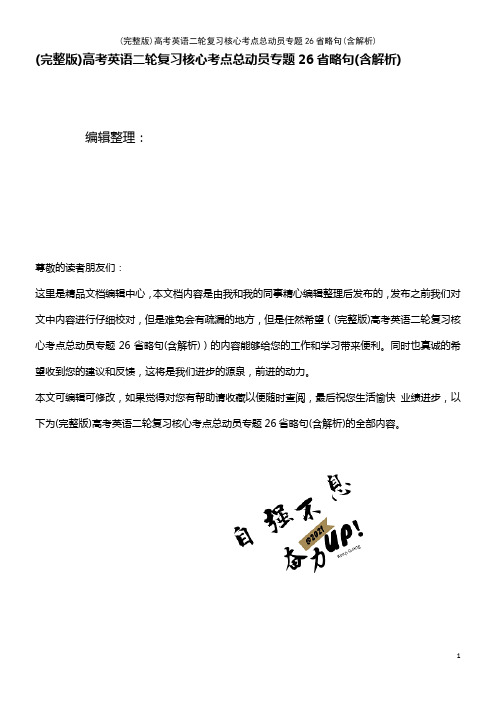
(完整版)高考英语二轮复习核心考点总动员专题26省略句(含解析) 编辑整理:尊敬的读者朋友们:这里是精品文档编辑中心,本文档内容是由我和我的同事精心编辑整理后发布的,发布之前我们对文中内容进行仔细校对,但是难免会有疏漏的地方,但是任然希望((完整版)高考英语二轮复习核心考点总动员专题26省略句(含解析))的内容能够给您的工作和学习带来便利。
同时也真诚的希望收到您的建议和反馈,这将是我们进步的源泉,前进的动力。
本文可编辑可修改,如果觉得对您有帮助请收藏以便随时查阅,最后祝您生活愉快业绩进步,以下为(完整版)高考英语二轮复习核心考点总动员专题26省略句(含解析)的全部内容。
(完整版)高考英语二轮复习核心考点总动员专题26省略句(含解析) 编辑整理:张嬗雒老师尊敬的读者朋友们:这里是精品文档编辑中心,本文档内容是由我和我的同事精心编辑整理后发布到文库,发布之前我们对文中内容进行仔细校对,但是难免会有疏漏的地方,但是我们任然希望(完整版)高考英语二轮复习核心考点总动员专题26省略句(含解析) 这篇文档能够给您的工作和学习带来便利。
同时我们也真诚的希望收到您的建议和反馈到下面的留言区,这将是我们进步的源泉,前进的动力。
本文可编辑可修改,如果觉得对您有帮助请下载收藏以便随时查阅,最后祝您生活愉快业绩进步,以下为 <(完整版)高考英语二轮复习核心考点总动员专题26省略句(含解析)〉这篇文档的全部内容。
专题 26 省略句关键词:基本结构,特殊句式,还原法,句子成分难度系数:✱✱✱✱推荐指数:✱✱✱✱✱【基础回顾】考点归纳:词法上的省略1。
名词所有格后修饰的名词在以下情况可以省略:①如果名词所有格修饰的名词在前文已出现,则可以省略。
②名词所有格后修饰的名词如果是指商店、住宅等地点时,这些名词也常常省略.2。
冠词的省略①为了避免重复②在副词的最高级前面的定冠词常可以省略。
③在某些独立主格结构中。
④在as引导的让步状语从句中,当作表语的单数名词提前时,不定冠词要省略。
高考英语省略句知识点图文解析(4)
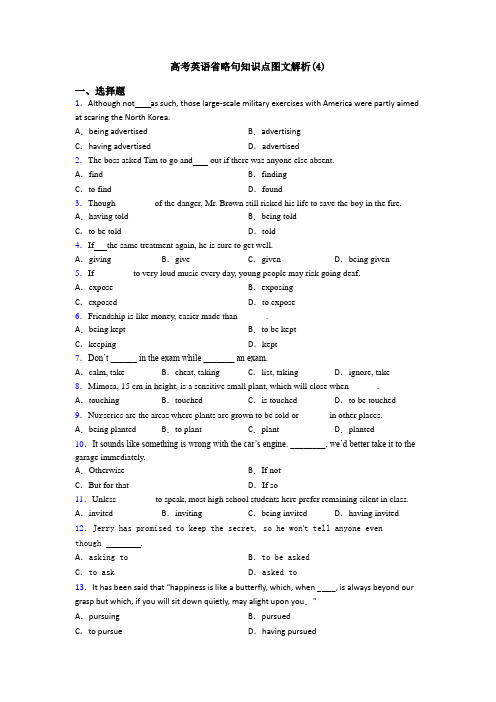
高考英语省略句知识点图文解析(4)一、选择题1.Although not as such, those large-scale military exercises with America were partly aimed at scaring the North Korea.A.being advertised B.advertisingC.having advertised D.advertised2.The boss asked Tim to go and out if there was anyone else absent.A.find B.findingC.to find D.found3.Though ________ of the danger, Mr. Brown still risked his life to save the boy in the fire. A.having told B.being toldC.to be told D.told4.If the same treatment again, he is sure to get well.A.giving B.give C.given D.being given5.If ________ to very loud music every day, young people may risk going deaf.A.expose B.exposingC.exposed D.to expose6.Friendship is like money, easier made than ______.A.being kept B.to be keptC.keeping D.kept7.Don’t ______ in the exam while _______ an exam.A.calm, take B.cheat, taking C.list, taking D.ignore, take 8.Mimosa, 15 cm in height, is a sensitive small plant, which will close when ______. A.touching B.touched C.is touched D.to be touched 9.Nu r series are the areas where plants are grown to be sold or ______ in other places. A.being planted B.to plant C.plant D.planted10.It sounds like something is wrong with the car’s engine. ________, we’d better take it to the garage immediately.A.Otherwise B.If notC.But for that D.If so11.Unless ________ to speak, most high school students here prefer remaining silent in class. A.invited B.inviting C.being invited D.having invited 12.Jerry has promised to keep the secret, so he won't tell anyone eventhough .A.asking to B.to be askedC.to ask D.asked to13.It has been said that “happiness is like a butterfly, which, when _ _, is always beyond our grasp but which, if you will sit down quietly, may alight upon you."A.pursuing B.pursuedC.to pursue D.having pursued14.The little girl seldom, , turned to her parents for help.A.if ever B.if any C.if possible D.if so15._____ told that the concert was cancelled, many fans still gathered outside the stadium , waiting for the pop singer.A.Unless B.Though C.When D.Whether 16."Talking with others in the real world always me embarrassed and my heart beats quickly. I never dare to look in anyone’s eyes when ," the 22-year-old said, describing her anxiety. A.make; speaking B.makes; speakingC.makes; speak D.make; speak17.The driver stopped the car a cat across the street.A.to let; to walk B.letting; walkC.letting; walking D.to let; walk18.Unless _______ , he kept silent all the time.A.spoken B.being spoken to C.spoken to D.speaking to 19.The new treatment means, if _______ to the NCR will make all the difference for the general public.A.applying B.to apply C.applied D.having applied 20.When ________ to someone,I usually say,“Pleased to meet you.”A.introduce B.introduced C.introducing D.am introduced 21.When ________ how a statue from distant Greece could have appeared in China, researchers explained that ________ this was a result of Alexander the Great’s influence.A.asking; no doubt B.asking; no wonder C.asked; no doubt D.asked; no wonder 22.When ________ for his views about his teaching job, Philip said he found it very interesting and rewarding.A.asking B.asked C.to ask D.having asked 23.—Have you got any particular plans for the coming holiday?—Yes. ______, I'm going to visit some homes for the old in the city.A.If ever B.If busy C.If anything.D.If possible 24.When challenges and setbacks, he remains , brave and firm.A.faced with… hesitant B.facing… resoluteC.in face of… indecisive D.facing with… determined25._____, a man who expresses himself effectively is sure to succeed more rapidly than a man whose command of language is poor.A.Other things were equalB.Other things being equalC.To be equal to other thingsD.Other things to be equal【参考答案】***试卷处理标记,请不要删除一、选择题1.D解析:D【解析】试题分析:D;考查非谓语动词。
高考英语最新省略句知识点知识点总复习含解析(1)
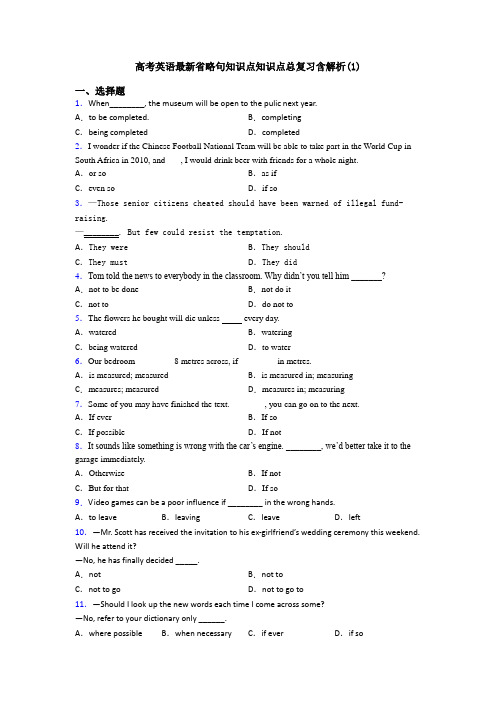
高考英语最新省略句知识点知识点总复习含解析(1)一、选择题1.When________, the museum will be open to the pulic next year.A.to be completed. B.completingC.being completed D.completed2.I wonder if the Chinese Football National Team will be able to take part in the World Cup in South Africa in 2010, and ___, I would drink beer with friends for a whole night.A.or so B.as ifC.even so D.if so3.—Those senior citizens cheated should have been warned of illegal fund-raising.—________. But few could resist the temptation.A.They were B.They shouldC.They must D.They did4.Tom told the news to everybody in the classroom. Why didn’t you tell him _______?A.not to be done B.not do itC.not to D.do not to5.The flowers he bought will die unless every day.A.watered B.wateringC.being watered D.to water6.Our bedroom ________ 8 metres across, if ________ in metres.A.is measured; measured B.is measured in; measuring C.measures; measured D.measures in; measuring7.Some of you may have finished the text. _______, you can go on to the next.A.If ever B.If soC.If possible D.If not8.It sounds like something is wrong with the car’s engine. ________, we’d better take it to the garage immediately.A.Otherwise B.If notC.But for that D.If so9.Video games can be a poor influence if ________ in the wrong hands.A.to leave B.leaving C.leave D.left10.—Mr. Scott has received the invitation to his ex-girlfriend’s wedding ceremony this weekend. Will he attend it?—No, he has finally decided _____.A.not B.not toC.not to go D.not to go to11.—Should I look up the new words each time I come across some?—No, refer to your dictionary only ______.A.where possible B.when necessary C.if ever D.if so12.—Have you been to the Great Wall?—Perhaps not in my memory; ________, it might have been during the early childhood.A.if any B.if soC.if ever D.if not13.The director was fully convinced that this moving story, if ______ for television, would be a hit.A.adapted B.being adaptedC.to be adapted D.having been adapted14.He is only too ready to help others, seldom, ____, refusing them when they turn to him. A.if never B.if ever C.if not D.if any15.--- The weather forecast says it’ll be fine tomorrow.---________, what about going hiking ?A.If possible B.If necessaryC.If so D.If real16.This golden opportunity _____ your full attention although ________ to seize.A.worthy of; is hard B.worth; being hardC.is worthy; it hard D.is worth; hard17.---How is the man injured in the earthquake?---The doctor said if _________ in a proper way, he was likely to be saved.A.treated B.treatingC.is treated D.to be treated18.They finished their work earlier than ______.A.expected B.expectingC.to be expected D.being expected19.They did everything ________.A.as had been originally plannedB.as originally plannedC.as the original planD.as been originally planned20.The new treatment means, if _______ to the NCR will make all the difference for the general public.A.applying B.to apply C.applied D.having applied 21.When ________ for his views about his teaching job, Philip said he found it very interesting and rewarding.A.asking B.asked C.to ask D.having asked 22.When _______the two countries, we’ve found they have much in common. A.compared B.compare C.being compared D.comparing 23.When deeply ______ in work, he always forgets all about eating or sleeping. A.absorbing B.trapping C.absorbed D.trapped 24.Though _______ by her classmates, the little girl didn’t burst into tears or be in despair.A.leaving out B.left outC.being left out D.leave out25.We all know that, __________, the situation will get worse.A.not if dealt carefully with B.if not carefully dealt withC.if dealt not carefully with D.not if carefully dealt with【参考答案】***试卷处理标记,请不要删除一、选择题1.D解析:D【解析】考查动词的过去分词作状语。
- 1、下载文档前请自行甄别文档内容的完整性,平台不提供额外的编辑、内容补充、找答案等附加服务。
- 2、"仅部分预览"的文档,不可在线预览部分如存在完整性等问题,可反馈申请退款(可完整预览的文档不适用该条件!)。
- 3、如文档侵犯您的权益,请联系客服反馈,我们会尽快为您处理(人工客服工作时间:9:00-18:30)。
高考中的省略在英语中,有时为了避免结构上或内容上的重复,并使上下文紧密连接;有时因为语法的客观要求,句子中的一个或几个成分不需要表达出来,这种现象称为省略。
英语中的省略要求不破坏语法结构,要保持句子意义的准确无误。
省略有词法上的省略,也有句法上的省略,还有一种替代省略。
省略部分的成分和含义可从上下文或具体语言环境中找到而且是有章可循的,英语的省略大致有以下几种情况:一、简单句中的省略1)感叹句中常省略主语和谓语,如:What a hot day !How wonderful!2)在一些口语中可以省略某些句子成分,如:Anything else ?—Are you feeling better now ? —Much better . This way, please.二、并列句中的省略1)如果主语不同,而谓语动词中的一部分相同,则省略谓语动词中相同的部分,如:John must have been playing basketball and Mary doing her homework.2)主语相同,谓语动词也相同,则二者都可以省略,如:His advice made John happy, but Mary angry.3)主语相同,而谓语不同,则可以省略主语,如:He gave up drinking for several days, but soon returned to his old ways.4)在并列复合句中,如果that从句从属于第二个并列句且它的谓语动词和宾语等其它一些成分与第一个并列句相同,that从句通常可以省略这些相同的部分,如:Jack will danceat the party, but I know Tom won't .三、复合句中的省略I)名词性从句中的省略(1)作宾语的what从句中的谓语动词与主句的相同,则what从句可以省略谓语,甚至主语,如:Someone has used my bike, but I don't know who .He has gone, but no one knows where.(2)引导宾语从句的连词that在口语中常常省略,或并列的宾语从句中的第一个连词that 也能省略,如:He said he had arrived here two days before and that he had lived in a hotel.(3)在某些表虚拟语气的主语从句、宾语从句、表语从句和同位语从句中,从句谓语动词中的助动词should可以省略。
这些句子一般包含如下动词一及其派生词:一个坚持(insist),二个命令(order, command),三建议(suggest, propose, advise ),四要求(demand, require, request, ask) ,如:It's important that we speak to the old politely.Jane's pale face suggested that she was ill and her parents suggested that she have a medical examination.(4) It is necessary(important, impossible, strange, natural, a pity, no wonder) that...主语从句中,如: It is necessary that the problem be solved at once.(5)有时也可以根据说话的情景来省略主句中的一些成分,如:Sorry I've kept you waiting so long.II)定语从句中的省略(1)在限制性定语从句中,作宾语的关系代词that, which, who (whom)常可以省略,如:The man I saw is called Tom.Where is the pen I bought this morning?(2)关系副词when, where, why及that在the time when, the place where, the reason why, the way that结构中引导限制性定语从句时,在非正式场合下,可以省略关系副词when, where, why和that等,如:I shall never forget the day we first met.The reason he came so early is his own affair.I don't like the way you speak to yourmother.III)状语从句中的省略(1)当状语从句中的主语和主句的主语一致,或状语从句中的主语是it,并且又含有be 动词时,常可以省略从句中的主语和be动词,如:He did as told. Though tired, they went on working.You shouldn't come to his party unless invited.He paused as if expecting her to speak.(2)虚拟条件句中,含助动词,情态动词,动词be或have等,若将它们提到句首,则需省略if,如: Should it rain tomorrow ,we would have to put off the visit till next week.(3)在as(so)... as..., than引导的比较状语从句中,如:I know you can do better than Peter . This car doesn't run as fast as that one .(4)在as引导的让步状语从句中,当作表语的单数名词提前时,不定冠词要省略,如:Child as he is, he knows a lot.四、动词不定式中的省略1)有些动词,如:believe, find, think, feel, consider, imagine, prove等后作宾补的结构to be + n. / adj. 中的to be可以省略,如:I consider him stupid.His mother found him a clever boy.2)感官动词see, hear, feel, watch, notice 等以及使役动词let, make, have后作宾补的动词不定式中的不定式符号to要省略,但变为被动结构时,to必须保留,如:They made the boy go to bed early. The boy was made to go to bed early.3) 动词不定式在like, love,care,want,hope,wish,expect,prefer,refuse,decide, mean, intend, try,promis等动词后作宾语时,为了避免重复,常承前省略不定式后的内容,但要保留不定式符号to,如: I have asked her to come,but she does not want to.---Are you and Jane getting married?---We hope to.注意:want,like用在when,if ,what,as 引导的从句中,其后的to也常可省略,如:I've decided to do what I like.I'll teach you if you like.I would do it for you, but I don't know how to4)在can not but, can not choose but, do nothing but..., can't help but..., prefer to do rather than do ...., would do... rather than... 之后的动词不定式一般不带to;but之前有实义动词do的某个形式do, does, did, done 而且其宾语是something,nothing,anything和everything 等不定代词时,也不带to, 否则要带to,如:We have nothing to do now but wait.I can not but admire his courage.He has no choice but to accept the fact.5)在并列结构中为了避免重复,后一个to省略,如:I'm really puzzled what to think or say.但两个不定式有对照或对比的意义时,则后一个to不能省略,如:I came not to scold but to praise you.6)在why, why not 引导的特殊问句中后跟省略to的动词不定式,如:Why talk so much about it?Why not try it again?7)动词不定式与be able to,be going to,have to,ought to,used to等构成复合谓语时,不定式结构常可省略,但要保留不定式符号to,如I don’t want to wait for him,but l have to.He doesn’t like fish,but he used to.---Why didn’t you come to our party?---I was going to,but l had a report to write.8)动词不定式中动词原形部分是否省略,主要看句子前面是否已出现过同样的动词。
如果句子前面出现过同样的动词,为了避免重复,句子后面的不定式常省略动词原形,而保留不定式符号to,如:They may go if they wish to.Don't go till I tell you to.9)动词不定式在ask,warn,tell,advise,force,wish,expect,allow,permit , invite, persuade, order, would like, forbid等动词后作宾语补足语或主语补足语时,常可省略,如:She wants to come,but her parents won't allow her to.Don’t touch anything unless your teacher tells you to.You'd better give a performance if you are asked to.He didn't come, though we had invited him to.10)动词不定式在happy,glad,eager,anxious,willing,ready等形容词等后承前省略动词原形,只保留不定式符号to ,如: ---Will you join me in a walk?---I'll be happy to.I think he should get a job,but you can't force him to if he's not ready to.注:承前省略的动词不定式如果有助动词have或be,则要保留be或have,如:---Are you a doctor? ---No, but I used to be .五、某些词法上的省略1. 名词所有格后修饰的名词在以下情况可以省略1)如果名词所有格修饰的名词在前文已出现,则可以省略,如:These are John's books and those are Mary's .2)名词所有格所修饰的名词,若表示住宅、店铺、教堂或上文已暗示或明确指出过的事物时,常常可以省略。
